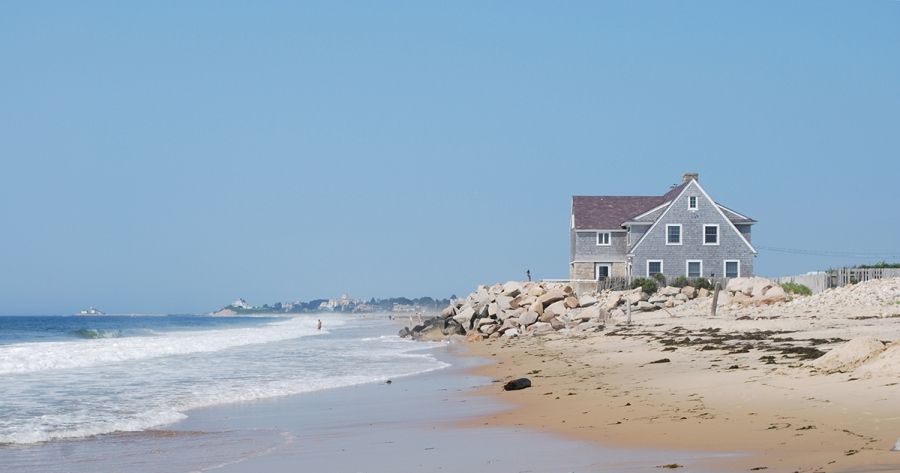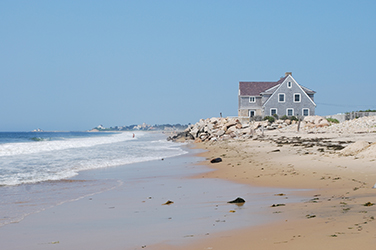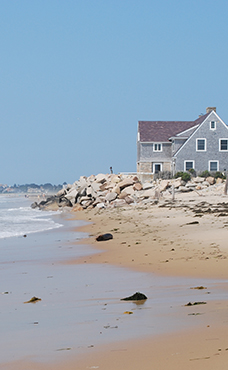
- Free Article: No
- Contents Category: Calibre Prize
- Custom Article Title: The Morning Belongs to Us
- Review Article: Yes
- Article Title: The Morning Belongs to Us
- Online Only: No
- Custom Highlight Text:
We woke early that morning as the sun lit up the two shared bedrooms, three of us in each one. The thin, printed cotton curtains were no match for that kind of light. We were eighteen years old. It was the first weekend of our first semester at university, and we had come to the beach house armed with our readers and highlighters.
- Featured Image (400px * 250px):

- Alt Tag (Featured Image): 'The Morning Belongs to Us', by Siobhan Kavanagh
Some of us put suntan oil on, others lectured about wrinkles – not so much cancer, but wrinkles were to be avoided. We lay on our beach towels and cast glances at each other’s bared limbs, coveting the longest. One of us got a nosebleed from the heat, the claret red dropped onto the sand in ugly blotches.
‘Loser,’ one of us joked and we laughed, even the one with the nosebleed, which made blood spray out with force.
When it was time to go – it was too hot, and we really did have to study – we peeled ourselves up and raced into the sea, up to our waists. Vast water and vast sky all at once, in one morning.
Back up the sandy slopes, past the to-be-demolished house, down the road to the beach house. We walked slowly with the pleasant tiredness of a hot day, then slumped on the deck and read the newspapers, played UNO and drank Earl Grey Tea. We told each other things from the newspapers. One of us held up a page with John Howard’s face on it – he was touring Ground Zero. We hated him. Everyone in our tutorials hated him. On the other page, flapping in the breeze, was a photo of an asylum seeker behind the wire at Woomera, lips sewn, eyes burning. We shook our heads. We could vote for the first time at the next election.
‘See you later, Little Johnny,’ one of us sang, drawing horns on his head.
∞
Midday, high sun and cloudless. We had read all the good parts of the papers, so on to the readers. If we read and highlighted and annotated enough readers, we could be anything, we thought.
A quiet hour passed, the heat intensifying.
Then, the crunching sound of tyres on the gravel driveway. We were not expecting anyone. A dark red car, a little beaten up, drove towards us, slowly, in a way that made it look like a creature.
The car stopped just in front of the deck, hand brake pulled but ignition running. Three of them, a couple of years older than us we guessed. The driver was shirtless, tanned, with blonde, sun-bleached hair. The other two wore singlets. The one in the passenger seat had dark hair, and the one in the back seat had a cap on. They all wore sunglasses, the mirrored type, so we couldn’t analyse their eyes. They looked at us with half smiles. Words spilled from the corners of their narrow mouths, too quiet for us to hear. The passenger guy opened the car door and put one leg out. A stocky, fair, hairy leg. He was wearing red thongs. The guy in the back had his arm out the open window, drumming his fingertips on the roof of the car. A waiting sound. A watching sound.
We noted these things. We can recall these details twenty years later.
We did not like them. We wanted them to go away but didn’t know how this could be achieved, or what they were capable of, or what they wanted.
One of us – the one who always knew what to say – knew we were counting on her to do something. She slapped her UNO cards down on the deck and got up. She brushed sand off her singlet and drank slowly from her water bottle. She sighed. The imposition of this stuff. It was tiring.
We could feel her move and we held our breath. She wandered over to the car.
‘Hey guys.’
‘Hey,’ the driver said. ‘What are you girls up to?’ He was smoking, holding the cigarette out the window.
‘Nothing much, just chilling,’ she said, gesturing back at us. We were not reading the papers, or annotating our readers, or drinking our tea. We were looking through them. We were sure they would smell of Lynx and stale sweat.
‘What are you guys up to?’ she asked back. As if we cared. But then, we had to care. If they got out of the car, what would that mean?
Why did they have half smiles and narrow mouths?
How far away were our phones?
Was there anyone home at the soon-to-be-demolished house?
Why did they think they could come here and make us feel this way?
We knew no one ever made them feel this way.
‘Nothin,’ the driver replied, a quick smile. ‘Just chilling too.’
∞
A silent stalemate ensued, probably only a minute, but a long one. High above in a gum tree, a cockatoo screeched, breaking the quiet.
The sound was brash and grated through the density of us looking at them, and them looking at us. We broke our gaze to look up and saw thousands of grey-green leaves dancing in the breeze and six cockatoos perched on branches, watching.
The driver cocked his head towards his mate in the front seat. He said something low and half laughing. The passenger’s leg went in, and the door closed, hand brake down. We could hear this little thing happen, in the stillness.
‘Catch ya,’ the driver said. He let the cigarette, still alight, drop to the earth. He drove around the circular driveway and out, and we watched until we couldn’t see the beaten-up red car any longer.
The one of us who spoke to them came back to the deck and put her thongs on, then went and stubbed the cigarette out with her foot. Stamped on it for far longer than was necessary.
We raged at them for throwing a cigarette onto dry grass, a tinderbox in that heat. We were eighteen years old and we were already tired of putting out fires that we hadn’t started.
∞
We packed up our readers and made sandwiches for lunch. One of us rifled through the CD collection and pulled out Van Morrison. We yelled the ‘G-L-O-R-I-A!’ bit and decided it was time to open the Oyster Bay sauvignon blanc, a wine we were set on for some reason, although we really knew nothing about wine.
We felt rattled, but no one felt it was worth talking about. We knew of a black hole in the galaxy that sucked in and held things like this.
Like when one of us was followed in broad daylight and he said, ‘I just had to follow you’, as if that explained it, and when another of us was followed at dusk, the man emerging from parkland and fading away, only to emerge further down the path, exposed, and when another of us always felt her boss press into her at the cash register, with a queue of customers watching, oblivious, and when hands wandered onto our legs in cinemas, trains, trams, and when another of us stood frozen in a lift, aged seven, while an old man stroked her ponytail and when our parents gave sympathetic shrugs but never told us to do anything about any of this.
We cracked open another Oyster Bay and we turned the music up.
∞
We returned to the beach house many times over the following years, during semester breaks, grey weekends in winter, over long summer days. Sometimes new friends and pets and partners joined – babies too, eventually.
Other beach houses were bought and sold around it, knocked down and reconstructed, tennis courts and all. But this one was solid and straightforward. It needed no tinkering. It held within it our laughter and worries and late night talks. It was a place of no plans, and Earl Grey Tea and deep sleep after being out in the sun.
There was nothing like the feeling of driving out of the city towards it.
∞
Occasionally, one of us asks if the others remember the incident.
We do.
We wonder – did they pull up in other driveways? Did gravel crunch and compress under their tyres elsewhere, a slow prowl? Did any of them feel unease curdling in their stomach? We wonder if any of them remember this now, so many summers ago, and we begrudge the space it takes up in our minds and not theirs. We begrudge how the recollection can unsettle us still.
And then we wait for the counterattack to snake through our minds – really, come on now, nothing happened.
It is hard to explain that such a nothing can be something. It is hard to explain the tiny aggressions, the familiar quickening heartbeat on any empty street at nightfall. How we appraise that walking track winding into secluded bush. How we hold our keys like a knife, how we are grateful for the alertness of our dogs, how we cry and seethe and say nothing at the stories we hear.
Actually – not just streets at nightfall. It is bone-deep exhausting to know this.
∞
After the wine and the Van Morrison, there was no chance of going back to the readers. We had copped a bit of sunburn to the shoulders on that walk. We were slightly drunk. Freckled, glowing, young faces. We lay on the deck in the late heat of the day, cicadas whirring. We commented on the shapes of clouds, and we owned that afternoon.
∞
The next night, back in the city, we went to a party for a friend’s birthday. It was at his dad’s apartment in Collins Street, and his dad was away. The building had a dysfunctional lift that sometimes stopped between floors, and we would feel a mild panic about being stuck in there forever, and would pass the time carving our initials into the walls with our keys. The lift would lurch to life, and we would laugh, as if we were never actually worried about being trapped.
A new friend from university was there and he had decks, so we pushed all the furniture against the walls to make a dance floor in the lounge room. When we needed a break from dancing we burst onto the balcony, where people were smoking and talking. We thought it was a great idea to sit on the balcony ledge, ten stories high and too many drinks in, and feel the thrill of the height and the lights of the city twinkling on our straight, strong backs.
We didn’t tell anyone what had happened because there wasn’t, on the surface, much to tell. We told ourselves, whenever it crossed our mind, that there was no need to be concerned about a man drumming his fingers on the roof of a car, just drum, drum, drumming his fingers like that.



Comments powered by CComment